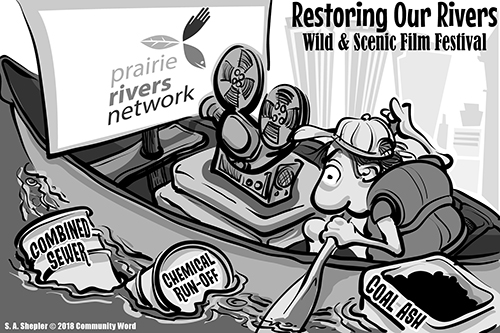 When rivers are used as sloughs for waste, pollution, plastic and agricultural runoff, the damage is hazardous, ugly and demoralizing.
When rivers are used as sloughs for waste, pollution, plastic and agricultural runoff, the damage is hazardous, ugly and demoralizing.
In a call to action, Prairie Rivers Network is hosting the “Wild & Scenic Film Festival” at Peoria Riverfront Museum Sept. 27.
The festival is considered one of the nation’s premier environmental and adventure film festivals and draws top filmmakers and celebrities. It’s a combination of “stellar filmmaking, beautiful cinematography and first-rate storytelling to inform, inspire and ignite solutions and possibilities to restore the earth.”
The festival includes 11 short films. One, “Defend the Fork,” is about Illinois’ only National Scenic River. The film was produced by Prairie Rivers Network and highlights the threat of coal ash toxins leeching into the Middle Fork of the Vermilion River from the Vermilion Power Plant Station owned by Dynegy.
Coal ash is a hazardous toxin that includes lead, arsenic, boron, mercury, cadmium and more.
In the Peoria area, we have the E.D. Edwards Power Plant along the Illinois River in Bartonville. The coal ash pond there is unlined and the hazard is ranked high, meaning if a breech occurs, loss of life is expected.
Andrew Rehm, policy analyst at Prairie Rivers Network, said even if market forces prevail and the end of the era of coal is approaching, the end is not near for the hazard of coal ash that has accumulated and is polluting the environment. It is an enduring legacy of irresponsible environmental regulations.
The Obama Administration established a federal regulation calling for public disclosure of test results of toxic coal ash residues at power plants. The Trump Administration has proposed dropping that public disclosure.
“There is no perfect solution for coal ash, but the worst possible place (to store it) is along rivers,” Rehm said, noting that scrubbers installed in industrial smokestacks have helped to clean the air but leave unresolved the growing mounds of coal ash.
However, even in terms of air pollution, President Trump’s own EPA estimates his rollback on coal emissions will lead to 1,400 more deaths annually, 15,000 new respiratory problems and tens of thousands of missed school days.
The Wild and Scenic Film Festival includes shorts on some of America’s iconic rivers. But we have some beautiful rivers right here in Illinois, said Jeff Kohmstedt, communications and outreach coordinator at Prairie Rivers Network.
Learning to see the “unnoticed beauty” at home serves to raise awareness to the threats to rivers including pollution, climate change and pesticides, he said.
In Illinois, major threats also include high levels of nitrates from agricultural runoff and phosphates from sewage.
Peoria’s combined sewer overflow problem resulted in years of dumping untreated human sewage into the Illinois River during periods of high rainfall. Negotiations with the EPA are ongoing and Peoria is left with an awkward storm water tax assessment for all impermeable surfaces including roofs, driveways, roads and parking lots.
We know we have a CSO problem that needed to be corrected decades ago. We know we pay some of the highest property taxes in the state. We know storing toxic coal ash along the river is risky. We know we have an agricultural chemical cocktail running off fields and into the river, contributing to the dead zone in the Gulf of Mexico.
Maybe “Wild and Scenic” can help mobilize us to advocate for the river, the environment and incentivize solutions to problems rather than paying taxes, fees and fines for correcting problems.
Journalism Endangered Means Truth Endangered
Negotiations are tense at the Journal Star and other GateHouse Media newspapers in Illinois. The contract expired seven months ago for the Peoria newsroom. The corporation’s strategy is transparent –– eliminate news and make the Journal Star a PR/marketing/ad firm. The future of PJS: become a multi-media marketing company.
Same endangered outlook for National Public Radio at Bradley University and Western Illinois University: Independent journalism is expendable.
Who’s left standing for local journalism?
Accepted at Stanford University
His message: “We can succeed despite all that’s going on. No matter what is in your past, there are second chances.”
Jason Spyres, featured in the April issue of Community Word, had a past to overcome. He had been sentenced to 30 years in prison on a nonviolent marijuana conviction and was released after nearly 15 years behind bars.
Stanford University has accepted Spyres on a full scholarship. He plans to major in operations research, engineering and management.
Before he left Peoria for Stanford, he filed a petition with Gov. Bruce Rauner asking for a pardon. His petition includes letters of support from Peoria County Sheriff Brian Asbell, Bartonville Police Chief Brian Fengel and several others.

Recent Comments